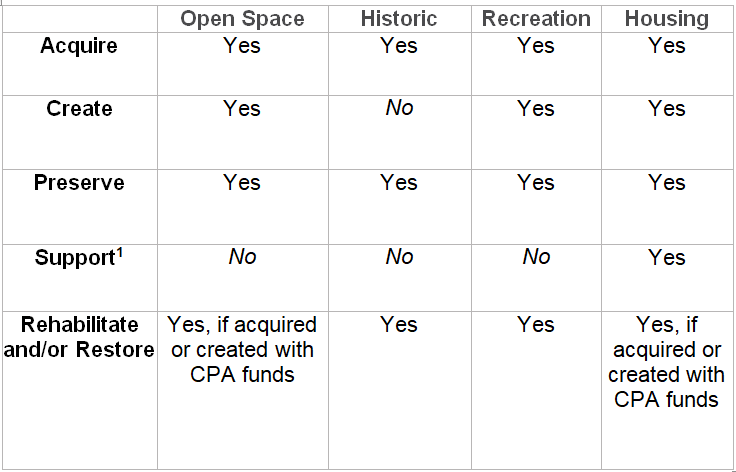Ideas for CPA-funded projects come from the community, not from the CPC itself. Organizations, town committees, or groups of dedicated volunteers identify a need in the community, develop a vision for a project to meet that need, complete the application process, and, if the project is approved, oversee implementation through project completion.
If you have an idea for a CPA-funded project, you should begin by ensuring your project aligns with one of the four categories allowed by the CPA law (see below). We also encourage you to review the CPC's Community Preservation Plan before you begin preparing your application. We suggest you also review the state-wide list of CPA-funded projects in the Community Preservation Coalition's database of projects to see if similar or comparable projects have been undertaken in other communities and which could serve as models for your application.
If you have an idea for a project and want to preview it with the Committee before starting on the application process, please contact the CPC at cpc@shutesbury.org. The Committee is more than happy to provide assistance and answer questions about the application process.
Project Categories
There are four areas defined by the CPA law that are eligible to receive CPA funds: open space, historic preservation, recreation, and community housing. The Committee encourages groups of volunteers to exercise creativity in these four areas and to propose projects, large or small, that benefit all of our citizens.
Open Space
For the acquisition, creation, or preservation of open space and for the rehabilitation or restoration of open space that is acquired or created with CPA funds.
Historic Preservation
For the acquisition, preservation, rehabilitation, or restoration of historic resources, where historic resources are defined as a building, structure, vessel, real property, document, or artifact that is listed or eligible for listing on the state Register of Historic Places or has been determined by the local Historical Commission to be significant in the history, archeology, architecture or culture of Shutesbury. The CPA prohibits the use of funds to create or build replicas of or replacements for historic resources.
Recreation
For the acquisition, creation, preservation, rehabilitation, or restoration of land for either active or passive recreational use. The CPA prohibits the use of funds to acquire, create, or preserve land for a stadium, gymnasium, or similar structure.
Community Housing
For the acquisition, creation, preservation, or support of community housing and for the rehabilitation or restoration of community housing that is acquired or created with CPA funds. Community housing is defined as low and moderate income housing for individuals and families, including low or moderate income senior housing.
Quick View of Eligibility

The Five Steps of Applying for CPA Funding
1. Determination of Eligibility (DoE)
Potential applicants must first complete the one-page Determination of Eligibility form. This document briefly summarizes your proposal so the CPC can determine the project’s eligibility and offer guidance. Potential applicants must submit both a hard copy and emailed copy of the Determination of Eligibility form (see the form for details).
Deadline: The deadline to submit a Determination of Eligibility for FY25 is December 5, 2024.
2. Application for Funding
If the CPC determines that your proposal is eligible, you must complete the Application for Funding. Examples of past applications are available upon request if you would like an example of how to prepare yours and what to include. Applicants must submit both a hard copy and emailed copy of the Application form (see the form for details).
Deadline: The deadline to submit an application for FY25 is February 6, 2025.
3. Review Process
Projects are evaluated and prioritized using the Evaluation Criteria described in the Community Preservation Plan.
The CPC reviews all applications at its February meeting. Applicants should attend that meeting to answer any questions the Committee might have about the project.
The final vote whether or not to recommend to Town Meeting that the project receiving funding is typically taken at the CPC’s March meeting. Applicants are strongly encouraged to attend that meeting as well in order to address any final questions the Committee might have.
If the CPC votes to recommend the project for funding, it will submit to the Select Board an article to that effect for inclusion in the upcoming Town Meeting warrant. Like all articles involving financial concerns, the Finance Committee will then vote on whether or not it supports the article's passage.
4. Town Meeting Approval
Each project must be approved by Town Meeting. A simple majority vote by Town Meeting is required to approve the funding for most recommended projects. For bonded projects and eminent domain proceedings, however, the CPA requires a two-thirds majority vote by Town Meeting.
5. Project Implementation
After the funding for a project is approved by Town Meeting, the CPC will issue a Grant Agreement for the recipient and the Select Board to sign. This agreement is a contract stipulating how the funds will be released and must be used, as well as other details about the grant, including conditions under which the grant may be terminated. A copy of the Grant Agreement can be found in the Community Preservation Plan.
Funds for approved projects and procedures for requesting payment are issued by the Town Administrator and are subject to the satisfaction of any conditions or procedures established by the CPC and Selectboard and agreed to by the recipient in the Grant Agreement.
